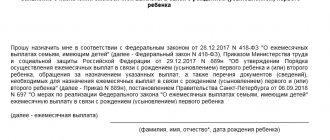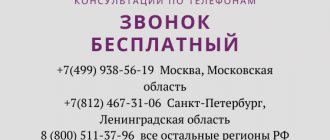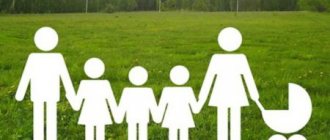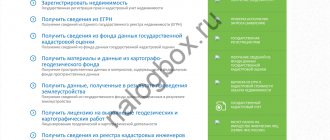Criteria for a low-income family
According to Federal Law N44, as amended in 2013, a low-income family is defined as one in which the average income per person is below the subsistence level. The term “family” means:
- parents - father and mother;
- children, both natural and adopted;
- grandparents;
- stepfathers and stepmothers;
- stepdaughters and stepsons.
Also, a family with a single mother or father can apply for low-income status. Large families with at least one disabled child first of all apply for low-income status and receive this status without any problems.
To obtain a certificate of low income, a family must also meet the following criteria:
- all family members must live, be registered in one place and lead a common life. By everyday life we mean the joint purchase of basic necessities, clothing, general goods, payment of utility bills and other bills, joint recreation and attending events. This must be confirmed by certificates, checks, tickets or, in extreme cases, by witnesses;
- The parents' marriage must be official. Simple cohabitation - regardless of the duration and number of children together - is not taken into account;
- All able-bodied family members of the appropriate age have an official job or are registered as unemployed. This does not apply to pregnant women and mothers on maternity leave.
If at least one able-bodied family member does not work without good reason, but because he does not want to or has bad habits (for example, alcoholism), the family cannot be regarded as needy.
In the regions, it is possible to present additional criteria for determining and obtaining the status of a low-income family.
Problems with receiving benefits for the poor
Problems with receiving benefits for the poor
As mentioned earlier, the lack of work for one or more family members is not a circumstance that allows government authorities to recognize a family as low-income. In other words, unwillingness to work is not a basis for providing a government subsidy. If one of the family members is not employed, you must register with the labor exchange to apply for benefits. At this stage, some citizens may have difficulties, since unemployment benefits are also considered income. If its size allows the total income to reach the subsistence level, it will not be possible to receive government support.
The Federal Law on Social Support describes situations in which a citizen who previously received payments may be denied further payments. This is primarily due to the provision of incorrect information about the composition of the family and its financial situation. However, the decision of the social protection authorities can be appealed in court.
The decision of the social protection authorities can be appealed in court
According to reviews from citizens who applied for low-income status, the system of work of regional officials is far from ideal. The main complaints are related to frequent refusals to compensate for expenses already incurred and long consideration of documents with subsequent refusal.
Social contract for low-income families
A social contract is a type of government support aimed at helping low-income families overcome a difficult financial situation. It is formalized in the form of a special agreement, which is concluded between low-income citizens and local social protection authorities. It describes a list of benefits and subsidies that the state provides in exchange for the family’s implementation of specific activities.
These activities do not provide specific benefits to the state, but are an individually developed plan for low-income citizens to help them improve their financial condition. The state may prescribe the following points:
- finding work for able-bodied citizens;
- if necessary, undergo free education or training;
- assistance and assistance in conducting any form of activity within the framework of individual entrepreneurship;
- supporting the functioning of subsidiary farming.
The main goal of the social contract is to encourage citizens to take measures that will ultimately lead to the possibility of self-sufficiency and prosperity in the long term.
Types of state support
There are several main types of government support for low-income citizens:
- Various cash benefits.
- Compensation. For example, up to 70% refund for kindergarten fees.
- Housing and utility subsidies for low-income families.
- Targeted state social assistance.
- Free provision of housing and land on social rental terms.
- Housing assistance programs.
- Other social services. For example, free travel or a trip to a camp.
Interesting information: Help for a young family from the state. Housing certificate and payments
Each type of state aid can be processed through different authorities. The main document here will be a certificate from social security recognizing the family as low-income.
The amount of assistance to low-income families is set at the regional level.
Payments, benefits and benefits for low-income families in 2021
Families with confirmed low-income status can apply and submit documents for several types of payments:
- for children under 1.5 and under 3 years of age separately;
- for a minor child until he reaches 18 years of age;
- for a large family.
In addition, the family can receive various subsidies, social benefits and discounts.
Separately, it is worth highlighting the “Putin payments”, which are awarded to low-income families with a small child under the age of 1.5 years.
Since 2021, by presidential decree, new forms of social support for low-income families, in which the average income per person does not reach the subsistence level, have been adopted. Until the child turns one and a half years old, the state additionally pays such families monthly support in the amount of the regional subsistence level.
Payments for the first child in a large or low-income family are issued by state social protection authorities, benefits for the second and subsequent children - by the Pension Fund. This is explained by the fact that for the first, money is allocated from the Federal budget, and for the rest, maternity capital funds are raised. This procedure may be revised after the new law on maternity capital comes into force, but precise information on this matter has not yet been provided.
Based on this, it becomes clear that due to payments for the second and subsequent children, maternal capital is gradually spent, so if there are plans for a mortgage or any other targeted loan, this point must also be taken into account.
In 2021, some adjustments were made to the rules, which state that a family in which one person has less income than twice the subsistence level can be considered low-income.
According to the law, regions themselves determine the amount of monthly payments that are due to such categories of citizens.
Other forms of social support for families with a child under 3 years old are Putin’s benefits, the amount of which is 10,000 rubles, as well as benefits for minor children, the procedure and amount of which are regulated by regional authorities.
As of 2021, such subsidy programs operate in 62 regions of Russia. Every year the number and list of participating regions changes, since funding directly depends on the birth rate in the territorial entity. If for the previous calendar year this coefficient has not reached 2, then the state assumes the obligation to pay state benefits, but when it crosses this mark, the region stops participating in the program for a year.
Topic details
Social payments to low-income families
✓ Monthly allowance for low-income families
The so-called “Putin payments” for children under one and a half years old. Payments are provided by presidential decree starting in January 2021.
For children under one and a half years old, a monthly allowance is paid equal to the subsistence minimum for a child in this region. For the first child, this benefit can be applied for through social security, and for the second and third, through the pension fund.
This is due to the fact that payments for the first child come from the federal budget, and for the second and third from maternity capital funds.
Starting from 2021, such payments are available to low-income families with an average per capita income below 2 times the subsistence level.
To receive payments, you must confirm your family status once a year, providing new information about your income.
Please keep in mind that social security authorities have the right to verify the income information of applicants.
✓ Payments with children under 3 years old
From January 2021, low-income families can receive a monthly allowance of 10,000 rubles for a child under 3 years of age if the average per capita income is below twice the subsistence level.
✓ Child benefit under 18 years of age
This benefit is assigned to families with income below the subsistence level. According to the current regulations, regions have the right to determine the amount of benefits and the frequency of their payment.
✓ Benefits for large low-income families
This support is available in 62 regions of the country. It provides for the payment of a monthly social benefit for the third child under three years of age. The amount of the benefit is equal to the subsistence minimum for a child in this region.
The number of regions that participate in this program varies, as it depends on the fertility rate in the region.
Subsidies for housing and housing and communal services
Regional authorities have the right to reimburse low-income families for some of the funds for housing and communal services.
If expenses on housing and communal services amount to more than 22% of family income, then the state will reimburse them. Regions may reduce these compensations.
With such compensation, the area of housing is of great importance. Compensation goes for a standard apartment - 18 square meters per person.
In order to receive this subsidy, you must pay off your utility bills. This approach should be abolished from 2021.
If a low-income family has a large debt for housing and communal services, then it can be restructured - writing off part of the debt or concluding an agreement on installment payments.
Option 2 is more common.
What steps need to be taken to restructure debt:
~ Write an application for installment payments for housing and communal services to the management company
~ After reviewing the application, sign the agreement
~ Strictly adhere to the payment schedule, otherwise the contract may be terminated.
State social assistance to low-income families with children
Such payments depend on the region and specific situation.
List of possible benefits:
~ free prescription medications for children under 3 years of age
~ the opportunity to visit theaters, government clubs and exhibitions for free
~ preferential mortgage lending
~ partial payment for housing and communal services
~ discounted or free travel on public transport
~ treatment of children in sanatoriums
Benefits for children, pupils and students from low-income families:
~ admission to kindergarten out of turn
~ free provision of school and sports uniforms
~ free two meals a day at school
~ quotas for admission to universities
~ additional scholarships.
You can also receive social assistance under a social contract. Then the state will allocate money and help solve a specific problem. But in this case you will have to account for the money.
Housing from the state. Exemption from state duty when buying and selling real estate
My man's family can count on receiving living space.
Article 51 of the Housing Code of the Russian Federation contains a list of conditions
if you have which you can get housing:
~ emergency condition of the house or apartment in which the family lives
~ living space per family member is less than the established norm
~ non-compliance of housing with sanitary standards
~ in the presence of a serious illness of one of the family members.
Note. Each region has its own standard of living space per family member, but according to the housing code it cannot be lower than 12 square meters.
To resolve this issue, an application and the following package of documents are submitted to the social protection authorities or the MFC:
~ apartment inspection report
~ certificate of family status
~ certificate of family composition
~ parents’ marriage and children’s birth certificates
~ sanitary passport
~ extract from Rosreestr stating that the applicant does not have other living space
~ income certificate for all working family members
~ certificate of receipt of a scholarship or pension
~ passports of family members
The application is reviewed within 30 days.
Housing can be obtained in the following ways: on the basis of a social tenancy agreement, receive a subsidy for the purchase of housing, or take advantage of a mortgage at a reduced rate.
It should be said right away that in practice, cases of issuing free housing are extremely rare.
Also, a low-income family has the right to receive an exemption from state duty when buying and selling real estate. To receive benefits, you must provide a document stating that you are low-income.
Then, when registering the transaction, no state duty will be charged, but you will have to pay for registering the mortgage.
Targeted assistance to low-income citizens
Such assistance to low-income families consists of monthly or one-time payments for various needs.
What payments are made in addition to other benefits and allowances.
These benefits must be registered with the social security authorities or the MFC. The list for submitting documents is specified in these organizations. Typically, applications for such benefits are processed within 10 days.
Also, low-income families can count on money from the young family program and a child tax deduction.
Documents required to obtain low-income status:
~ marriage and divorce certificate
~ passports of adult family members
~ death certificate of one of the spouses
~ children's birth certificate
~ income certificates in form 2-personal income tax for individuals, 3 personal income tax for legal entities and individual entrepreneurs for the last three months
~ extract from the house register stating that family members live together
~ certificates of receipt of scholarships of all types of benefits and other payments for 3 months
~ certificate of family composition according to form N 9
~ copies of work records
~ certificate from the employment center
~ TIN of all family members
~ bank account or card details
The status of a low-income family can be obtained from the social protection authorities or from the MFC.
In some regions, local authorities issue special social cards on which benefits are awarded. These cards also give you the right to free travel on public transport and attend various events.
Help for paying off housing and communal services
Separately, it is worth noting government assistance to pay off bills for housing and housing and communal services. Their cost is not fully reimbursed, but partially. For those cases when their cost exceeds 22% of the total family income. In Moscow, this program also operates, but for it the family must give more than 10% of their salaries to pay them.
Also, if there are large debts for housing and communal services, the family can apply for debt restructuring, write off part of the debts (usually fines and penalties), and also enter into a new agreement, which will set out a more favorable payment schedule.
In addition to various cash benefits, low-income families can receive:
- compensation for the full cost of prescription medications for children under 3 years of age;
- partial payment of bills for housing and communal services;
- tickets for visiting various events, concerts, exhibitions, as well as sections at government institutions;
- mortgage to improve housing conditions on more favorable terms;
- annual trips to a sanatorium for the treatment and rehabilitation of children;
- discounts or completely free travel on public transport in the city and beyond.
A complete list of additional payments and social support can be found in the regional social protection authorities that issue them.
Social assistance to low-income families
Another type of assistance that low-income families, both with and without children, can apply for is state social assistance provided by social protection authorities at the place of residence of needy citizens (Article 8 of the Federal Law "On State..." dated July 17, 1999 No. 178-FZ).
Such assistance includes one-time payments, food, and medicine. It turns out that it is done on an individual basis, depending on the degree of need of citizens.
One way to provide assistance is to conclude a social contract. Within its framework, a citizen or members of his family undertake obligations to get out of a difficult life situation (for example, find a job, get additional education, start a subsidiary farm, etc.), and in exchange for this they are provided with social assistance (one-time or periodic ).
To receive social assistance, you must submit an application to the local social protection authority and submit documents confirming the facts of poverty and the presence of a difficult life situation. A special commission reviews the application within 10 days and decides whether it is possible to make cash payments to low-income families with children (or without them) or provide other assistance.
Answers to common questions
Due to the different criteria and conditions for obtaining status, needy categories of citizens have many questions about this procedure.
Mortgages for low-income people – is it possible?
Mortgages for the wealthy have been operating in the Russian Federation for a long time and are referred to as social. It allows you to significantly reduce the interest rate on the loan, pay the down payment with other government subsidies or not pay at all, increase the repayment period, reduce the amount of monthly payments, or renegotiate the terms of payments if borrowers are insolvent.
Do they provide vouchers?
Low-income families can receive from the state free trips to a camp for children or to a sanatorium if the child, for health reasons, needs treatment or recovery from illness.
Are discounts possible?
Some regions in their budgets provide discounts for low-income people to pay utility bills, transport, and attend events with young children.
How to calculate income for low-income families (formula)?
Every family whose average income is lower than the officially established regional subsistence level can qualify for low-income status. To determine this indicator, it is necessary to sum up the entire official family income for the last three months, divide by three, and then by the number of people in the family. The result will be the average monthly income per person. If the value for one person is below the subsistence level established by regional authorities, the family may receive low-income status.
When calculating monthly income, the following can be taken into account:
- Salary according to the official labor system;
- Income received from property, for example, when renting it out;
- Social payments from the state: alimony, subsidies, benefits;
- Profit from subsidiary farming;
- Dividends from business;
- Royalties.
It should be borne in mind that, according to the law, a low-income family can only be one in which there are NO able-bodied adult citizens who do not work. Pregnant women do not fall into this category.
What to do if you are denied the status of a low-income family?
Denial of status to a low-income family occurs most often when it does not meet the stated criteria and can cope on its own without government assistance. However, if applicants are confident that they can legally claim this status, they can challenge the decision of the social security authorities in court. To do this, you can seek the help of a paid lawyer or take advantage of the right to free legal assistance.
Housing subsidy
The state provides assistance to low-income people to improve their living conditions. The subsidies apply to citizens of the Russian Federation. State programs are implemented by:
- Registration of those in need of improved housing conditions. Social housing for low-income people is provided from the state or municipal housing stock.
- Purchasing your own real estate or building a house using a social mortgage. It is distinguished by preferential interest rates, the presence of social guarantees, and the ability to pay the down payment or part of the loan using maternity capital. There are special programs that provide additional financing for repayment of a mortgage loan from budget funds. Thus, according to the “Young Family” program, up to 70% of the mortgage amount can be obtained from the state budget to pay for the cost of purchased housing. In 2021, low-income citizens will be issued mortgages for construction or finished housing at 6%, the rest of the interest will be covered from budget funds.
To register, you should contact local authorities, write an application and provide the following documents:
- passport of adult citizens;
- children's birth certificate;
- Marriage certificate;
- certificate of absence of residential property;
- certificate of family composition;
- income certificate.
The decision is made within a month, but before making it, the living conditions are examined by a commission. Mostly housing subsidies for low-income people are provided in the form of a certificate. To obtain housing in this way, you should follow the following algorithm:
- open a bank account for crediting certificate funds;
- choose residential real estate (when purchasing from a developer, its readiness must be more than 70%);
- draw up a purchase and sale agreement;
- provide an agreement to the bank to transfer funds to the seller;
- take a receipt from the seller about the receipt of money, draw up an act of acceptance and transfer of real estate;
- register property;
- provide a certificate of registration to the housing stock.
Conditions of receipt
Article 49 of the Housing Code of the Russian Federation states the right of low-income citizens to free priority housing. According to Article 51 of the Housing Code of the Russian Federation, citizens are recognized as in need of improved housing conditions and are registered for the allocation of social housing on the following grounds:
- There are no residential property owners or social housing tenants among family members.
- The premises in which low-income citizens live are unsuitable for habitation and are in disrepair.
- One of the family members is seriously ill.
- Several families live in one room (apartment, house).
- Owned or rented housing does not meet established standards. According to the law, 1 person is entitled to at least 18 square meters. m of living space.
- Swimming for beginners: how to breathe properly and stay on the water with video
- Hepatoprotectors for the liver
- Chicken with mushrooms in sour cream sauce: recipes with photos
Social supplement to pension.
For pensioners with an income below the minimum wage established in the region of residence, and above the minimum wage for the Russian Federation as a whole. Defined as the difference between the PM in Russia and the PM in the subject.
If the Regional PM is higher than the Russian average, and the pensioner’s income does not reach the subsistence level of the subject, then the citizen is paid a regional supplement determined in a similar way.
Separately, it is worth highlighting material assistance to the low-income. This is provided to citizens with incomes below the subsistence level or families with average earnings that do not reach the minimum wage in the form of cash contributions.
In this case, citizens receiving funds must enter into an agreement with the structure making the relevant decision.
The latter is a social contract, which presupposes the existence of a developed program for the exit of a citizen (family) from a difficult life situation (Article 8.1 of Federal Law No. 178).
The document has a limited validity period, which is equal to the period of financial support (from 90 days to a year).
The amount of cash assistance to the poor differs depending on the region of residence.
So, in accordance with Art. 4, 4.1 of the Law of the Moscow Region dated December 30, 2013 No. 189/2013-OZ, residents of the Moscow region who are below the poverty line can count on the following privileges:
- from 300 to 1000 rubles (per month) depending on the situation, but not more than 6 thousand rubles per year;
- 7 thousand rubles and 10 thousand rubles for citizens and families, respectively, when a difficult life situation is identified;
- 50 thousand rubles for citizens who have lost property, 30 thousand rubles for a family member in a similar situation.
Social contract for large families: how to get it.








